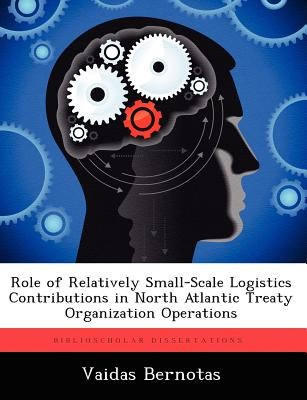
- We will send in 10–14 business days.
- Author: Vaidas Bernotas
- Publisher: BiblioScholar
- ISBN-10: 1249286190
- ISBN-13: 9781249286196
- Format: 18.9 x 24.6 x 0.5 cm, softcover
- Language: English
- SAVE -10% with code: EXTRA
Role of Relatively Small-Scale Logistics Contributions in North Atlantic Treaty Organization Operations (e-book) (used book) | bookbook.eu
Reviews
Description
In North Atlantic Treaty Organization, an entity of 26 member countries, logistics support to operations is challenged by a limited number of countries that are contributing logistics capabilities. These are large countries that bring a substantial amount of logistics capabilities into theater creating public good--logistics support, available for all in the theater. For small countries this situation is acceptable, because they enjoy multinational logistics as free-riders contributing to it only on an ad hoc basis. Therefore, small nations are interested in very limited logistics contributions, resulting in ineffective multinational logistics today. NATO should work with small countries identifying their comparative advantage capabilities. These will be so-called "niche" capabilities that small country can successfully provide. Through well-coordinated specialization of small countries in certain logistics areas, NATO can get considerable contributions from them. This will share logistics burden among all NATO members and also make multinational logistics system more effective and reliable. To achieve good coordination and management of logistics activities, these processes have to be run by a single authority. Current NATO logistics doctrine provides enough tools to implement multinational logistics; however, NATO lacks authority to effectively implement these tools. Forceful NATO leadership is therefore necessary in achieving effective multinationality.
EXTRA 10 % discount with code: EXTRA
The promotion ends in 18d.06:21:03
The discount code is valid when purchasing from 10 €. Discounts do not stack.
- Author: Vaidas Bernotas
- Publisher: BiblioScholar
- ISBN-10: 1249286190
- ISBN-13: 9781249286196
- Format: 18.9 x 24.6 x 0.5 cm, softcover
- Language: English English
In North Atlantic Treaty Organization, an entity of 26 member countries, logistics support to operations is challenged by a limited number of countries that are contributing logistics capabilities. These are large countries that bring a substantial amount of logistics capabilities into theater creating public good--logistics support, available for all in the theater. For small countries this situation is acceptable, because they enjoy multinational logistics as free-riders contributing to it only on an ad hoc basis. Therefore, small nations are interested in very limited logistics contributions, resulting in ineffective multinational logistics today. NATO should work with small countries identifying their comparative advantage capabilities. These will be so-called "niche" capabilities that small country can successfully provide. Through well-coordinated specialization of small countries in certain logistics areas, NATO can get considerable contributions from them. This will share logistics burden among all NATO members and also make multinational logistics system more effective and reliable. To achieve good coordination and management of logistics activities, these processes have to be run by a single authority. Current NATO logistics doctrine provides enough tools to implement multinational logistics; however, NATO lacks authority to effectively implement these tools. Forceful NATO leadership is therefore necessary in achieving effective multinationality.


Reviews